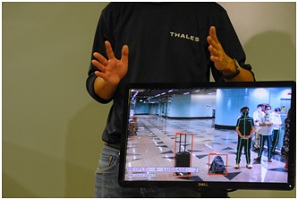Unattended luggage and commuters without a mask can soon be automatically detected by a video analytics system used by public transport operator SBS Transit. The system will be rolled out at five MRT interchange stations – Outram Park, Chinatown, Dhoby Ghaut, Little India and Serangoon – along the North East Line later this year, for a start.
It is expected to be used at interchange stations along the Downtown Line by next year. The system, which analyses visuals from SBS Transit’s existing closed-circuit television (CCTV) network, was developed by the operator and French firm Thales over the last 1½ years.
SBS Transit senior vice-president Jeffrey Sim, who is acting head of rail, said at a media preview: “Our whole underlying goal is really to enhance customer experience and also to enhance outcomes in safety and security.” The system will not replace station staff but will instead “be more of an enabler”, said Mr Sim, who is also SBS Transit’s head of the North-East Line/Sengkang-Punggol LRT and head of rail development.
Currently, staff have to patrol MRT stations regularly and monitor CCTV cameras to spot any issues. The system will help staff identify issues of unattended luggage, maskless commuters and unexpected crowds more quickly. It can gauge commuter density at the MRT stations – a functionality that was trialled at Woodleigh station in March. Mr Sim said the system will collect data to identify the usual crowd level at different times of the day. The software will then alert station staff whenever a bigger crowd than usual is detected.
Mr Cyrille Bataille, Thales’ head of integrated communications and supervision domain in Singapore, said the system can be expanded to add wheelchair identification and other functionalities without requiring additional infrastructure. SBS Transit is also studying how to make historical and real-time information about commuter density from the new system available to the public, said Mr Sim. This will then help people to better plan their journey to avoid crowds.
Mr Sim said the project was fully funded by SBS Transit, but declined to reveal the cost.
Station manager Roy Ong said the automated alerts by the new system will enable him and his colleagues to reduce time spent monitoring CCTV screens, freeing them to assist commuters.








